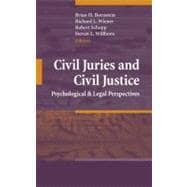
Note: Supplemental materials are not guaranteed with Rental or Used book purchases.
Purchase Benefits
What is included with this book?
| Preface | p. v |
| Introduction | |
| Crisis, What Crisis? Perception and Reality in Civil Justice | p. 1 |
| Approaches To Studying Civil Juries | |
| What's the Story? Explanations and Narratives in Civil Jury Decisions | p. 23 |
| Civil Juries in Ecological Context: Methodological Implications for Research | p. 35 |
| What is the Study of Jury Decision Making about and What Should it be About? | p. 67 |
| The Relationship Between Compensatory And Punitive Damages | |
| Crossing the Punitive-Compensatory Divide | p. 79 |
| The Relation between Punitive and Compensatory Awards: Combining Extreme Data with the Mass of Awards | p. 105 |
| Damages as Metaphor: A Commentary | p. 117 |
| Medical Injuries And Medical Evidence | |
| Faking It? Citizen Perceptions of Whiplash Injuries | |
| Reflections on Juryphobia and Medical Malpractice Reform | p. 151Stephan L |
| How Juryphobia and Fears of Fraudulent Claims Disserve Medical Malpractice Reform Efforts | p. 175 |
| Apologies And Restorative Justice | |
| Apologies and Civil Justice | p. 195 |
| Can We Talk? Therapeutic Jurisprudence, Restorative Justice, and Tort Litigation | p. 233 |
| Constructs of Justice: Beyond Civil Litigation | p. 257 |
| Conclusion | |
| Signs for the Future of Civil Justice Research | p. 273 |
| Index | p. 281 |
| Table of Contents provided by Publisher. All Rights Reserved. |
The New copy of this book will include any supplemental materials advertised. Please check the title of the book to determine if it should include any access cards, study guides, lab manuals, CDs, etc.
The Used, Rental and eBook copies of this book are not guaranteed to include any supplemental materials. Typically, only the book itself is included. This is true even if the title states it includes any access cards, study guides, lab manuals, CDs, etc.